Mississippi Medicaid pays for the pregnancy-related healthcare for over 60% of Mississippi births each year. Many pregnant Medicaid participants would not have been eligible for Medicaid prior to their pregnancy increasing the likelihood that they have gone uninsured for some time. Healthcare and policy experts have recommended extending postpartum coverage to support improved maternal and child health.
Why this is important
More than a third of births covered by Mississippi Medicaid occur to women with at least one known pregnancy … Read more...


